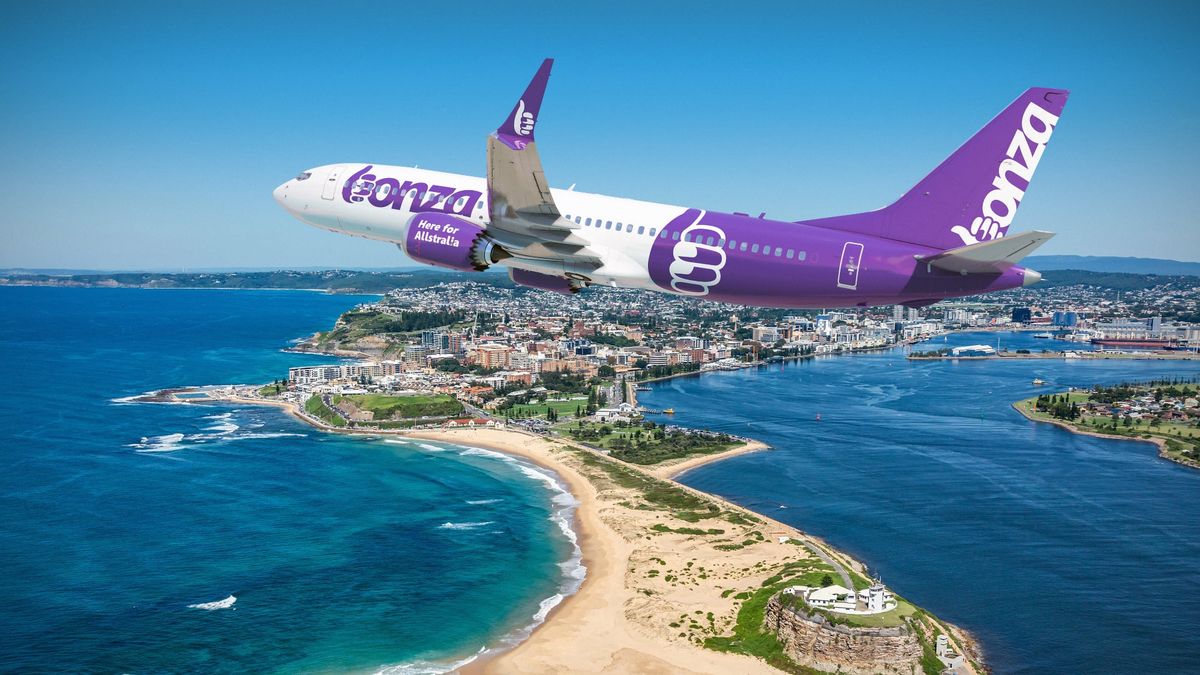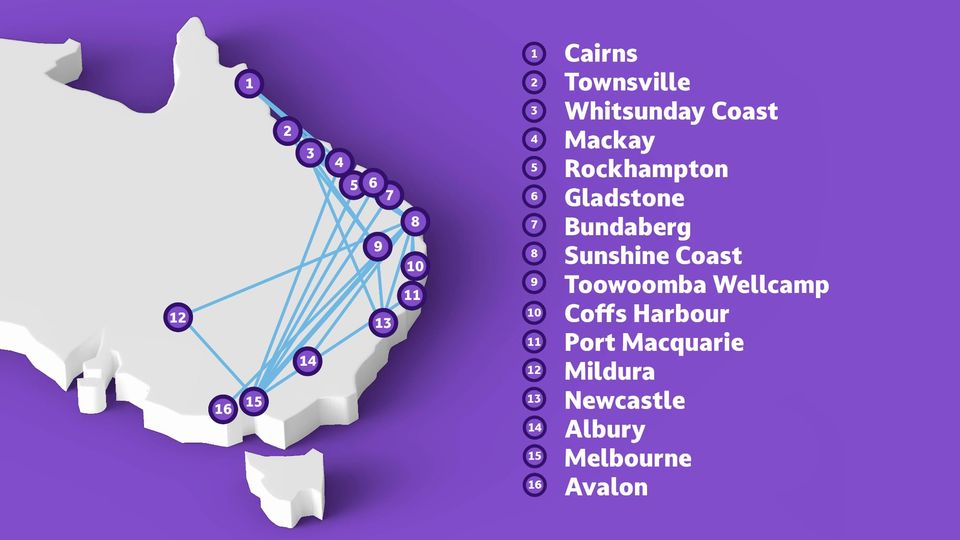How airline startup Bonza plans to boost regional tourism in Australia
The ambitious startup will fly all-economy Boeing 737 MAX jets across a network of regional destinations.

- Mid-year launch with 25 direct routes connecting 16 destinations
- Focus on regional towns and popular holiday destinations
- Fares to range from $50 to $100
Startup airline Bonza wants to shake up Australia’s regional skies when it launches in the middle of this year, and its opening gambit will see 16 destinations – with only one capital city among them – connected by direct flights pitched at the value end of the market.
That will translate to around $50 for a one-way ticket on flights of one hour, with $75-$100 for longer jaunts; those fares are expected to go on sale in March.
“With destinations ranging from Albury to the Whitsundays, travellers will now be able to fly, instead of impossibly long road trips as well as fly direct without a stopover in a major city,” promised CEO Tim Jordan.
“Aussies can look forward to enjoying more time at their destination and spending less of their hard earned cash getting there in the first place.”
Bonza’s network will shuttle Australian travellers to and from 16 destinations: Albury, Avalon, Bundaberg, Cairns, Coffs Harbour, Gladstone, Mackay, Melbourne, Mildura, Newcastle, Port Macquarie, Rockhampton, Sunshine Coast, Toowoomba Wellcamp, Townsville and the Whitsunday Coast.
“Since announcing Bonza to the world late last year, we’ve always said we wouldn’t just fly between Australia’s three largest cities and instead give people in the regions more choice,” Jordan said.
Those destinations will all be connected by Bonza’s new Boeing 737 MAX 8 jets, fitted with economy seats from tip to tail. Jordan says the low-cost carrier will launch with five of the fuel-efficient aircraft.
While Bonza will split its fleet across bases at the Sunshine Coast and Melbourne, many routes will also directly connect smaller regional centres, such as Cairns to Mackay and Rockhampton; Toowoomba to Townsville; and Newcastle and Toowoomba to the Whitsunday Coast.
Jordan says that 80% of its planned routes are not served by any airline, which will unlock opportunities for regional tourism and travel – and also means that Bonza isn’t setting out to start a price war, let alone an aerial dogfight, with the likes of Qantas and Virgin Australia.
“This is about opening up new routes and new markets… we’ve seen an opportunity in the marketplace, and one which is very complementary to existing operators,” explains Jordan.
Blue skies ahead for Bonza?
A low-cost alumn whose career has included operational and management stints at Virgin Blue, Cebu Pacific and FlyArystan, Jordan has long been eying the local market.
“When you look at the largest 15 domestic aviation markets in the world, Australia is the only one that has no independent low-cost operator.”
And now, he reasons, is the best time to change that.
“The light shines brighter every single day in terms of heading out of this revolting pandemic, and the opportunities in terms of executing Bonza with appropriate cost levels is now.”
It’s also the best time to be shopping for aircraft, Jordan believes, with Bonza’s deep-pocketed backers – Miami-based investment firm 777 Partners – “able to acquire aircraft at rates probably not previously seen, or at least not seen in a very long time.”
So, about that name…
Bonza was chosen for its Aussie resonance in signifying something which is simply yet unquestionably great. The Urban Dictionary goes as far as to assign it a meaning of “good and well executed”, a definition which Jordan fully embraces.
“That for me is exactly what we want to be. We want to be good, in fact we want to be great, and well executed. I'm a firm believer that whether you pay $10 or $1,000 (for an airfare) you deserve a great product.”
To Jordan, who is an unabashed champion of the LCC model, low-cost doesn’t equate to – in fact should never equate to – low quality.
“It upsets me when certain low-cost carriers don't deliver a quality product. You deserve on-time performance, and safety always goes without question.”
Low-cost champion
“So yeah, low-cost is my thing and there’s no hiding it,” he laughs candidly. “That's who I am and that's a natural extension of everything that I've been doing over the last 20 years.”
“I love the leisure traveller., and I love what we (low-cost carriers) do, taking people on holidays and to new places they haven't been, getting families back together more often… and that's exactly what we plan to do with Bonza.”
“Australia has some wonderful airlines that are very focused on the business traveller, and they execute wonderfully. But we will be for all Australian travellers, whether it's for teachers, tradies, kids or carers – that's our market.”
And those travellers will pay only for their seat and a single carry-on bag – in keeping with the LCC religion of ancillary revenue, everything else will be come with an additional price tag.
“I'm a massive advocate of choice, and I don't believe in people subsidising the person sitting next to them,” Jordan elaborates.
“If someone wants to choose and buy something to eat in the airport, that's up to them – if someone wants to buy something on board from us, then that's absolutely fantastic as well.”
“We're about personal choice and people putting together their own product, which suits them and their family.”
And it should go without saying that Bonza won’t indulge in frequent flyer programs, airport lounges or anything that’s a distraction from the core mission of “having the lowest cost we possibly can for our operations, because those low costs will allow us to deliver the lowest fares.”
Bonza won’t be Virgin Blue 2.0 (or Ryanair Australia)
Despite his roots at Virgin Blue, Jordan says Bonza won’t set out to replicate the Branson-backed airline which let went full-service as Virgin Australia before settling into its latest mid-market hybrid incarnation.
“Virgin Blue was a fantastic place to be when Virgin Blue was Virgin Blue, but there’s no intention to recreate that in any shape or form.”
“I think what we will do is build our own Bonza brand and culture. Will there be similarities? Possibly, over time, but if people see any hint of that, it's an unintended consequence and maybe it's just part of the Australian culture which is coming through.”
Nor will Bonza be an Aussie take on Ryanair, perhaps the world’s most famous – or perhaps infamous – ultra-low cost carrier.
Jordan sees more similarities with North American’s Allegiant Airlines, Europe’s Jet2 and especially Flair, a Canadian ‘ultra low-cost carrier’ also backed by 777 Partners.
Like Bonza, Flair – whose slogan is ‘Plane and Simple’ – flies only Boeing 737s, and mostly the MAX 8, launched in 2017, all-economy class, promotes itself as “the pioneers of ultra-low fare travel in Canada” and “an airline for everyone.”
The MAX factor
Those factory fresh Boeing 737 MAX 8 aircraft, leased through 777 Partners, will be another element of Bonza’s fresh approach – and it’ll make them Australia’s first airline to fly the 737 MAX, a full year ahead of Virgin’s planned mid-2023 delivery of the MAX 10.
The MAX 8s will arrive in an all-economy configuration that’s expected to be 186 seats – a dozen more than Qantas’ two-class Boeing 737-800s – although Jordan confirmed this isn’t the high-capacity ‘737-8200’ model which Boeing developed for low-cost carriers such as Ryanair.
And Jordan doesn’t believe that extensive media coverage of the MAX’s two fatal crashes and 20-month worldwide grounding could deter passengers from flying on the troubled aircraft.
“There are hundreds of MAXs flying around this world at this very minute. The aircraft is approved by Australia’s authorities for airlines currently operating into Australia and regulators around the world have certified that the aircraft is absolutely very safe to fly.”
